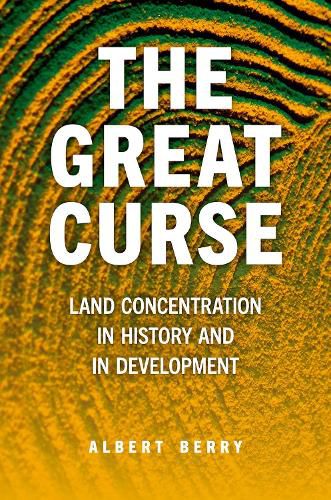Readings Newsletter
Become a Readings Member to make your shopping experience even easier.
Sign in or sign up for free!
You’re not far away from qualifying for FREE standard shipping within Australia
You’ve qualified for FREE standard shipping within Australia
The cart is loading…






Land concentration has been a central feature of the history of nearly all empires, regions, and countries, and has underpinned the creation of the state and of inegalitarian and elitist societies. It is the key feature of the "monopolization model", whereby a small group attains access to the great bulk of available land, labor, and capital to achieve a high level of income and wealth. The degree and means of land concentration, as well as the elite control of labor, have varied across cultures and time, but are responsible for an enormous amount of economic and social damage. In The Great Curse, Albert Berry reviews the main episodes of agrarian reform undertaken in the twentieth century to remedy land concentration, including those of major communist and capitalist countries. He provides an understanding of when landholding inequality arises, what implications it has for development in the short and long term, and what potential policies can fix it. Berry makes the case that agrarian reform has resulted in enormous benefits, from the lowering of income inequality and social depravation to a rise in total agricultural output and faster overall growth. Despite the benefits, he finds that most reforms fell far short of their desired outcomes due to conflict and partial or ineffective implementation. In some cases, large communal or state farms were created rather than small private family farms, and in other cases, too little land was redistributed or land was allotted to the wrong groups. Finally, Berry draws on various land reform policies in Sub-Saharan Africa--the only part of the developing world where over half of the labor force is still found in agriculture--with a view to providing useful lessons for its present and future policy in this domain.
$9.00 standard shipping within Australia
FREE standard shipping within Australia for orders over $100.00
Express & International shipping calculated at checkout
Land concentration has been a central feature of the history of nearly all empires, regions, and countries, and has underpinned the creation of the state and of inegalitarian and elitist societies. It is the key feature of the "monopolization model", whereby a small group attains access to the great bulk of available land, labor, and capital to achieve a high level of income and wealth. The degree and means of land concentration, as well as the elite control of labor, have varied across cultures and time, but are responsible for an enormous amount of economic and social damage. In The Great Curse, Albert Berry reviews the main episodes of agrarian reform undertaken in the twentieth century to remedy land concentration, including those of major communist and capitalist countries. He provides an understanding of when landholding inequality arises, what implications it has for development in the short and long term, and what potential policies can fix it. Berry makes the case that agrarian reform has resulted in enormous benefits, from the lowering of income inequality and social depravation to a rise in total agricultural output and faster overall growth. Despite the benefits, he finds that most reforms fell far short of their desired outcomes due to conflict and partial or ineffective implementation. In some cases, large communal or state farms were created rather than small private family farms, and in other cases, too little land was redistributed or land was allotted to the wrong groups. Finally, Berry draws on various land reform policies in Sub-Saharan Africa--the only part of the developing world where over half of the labor force is still found in agriculture--with a view to providing useful lessons for its present and future policy in this domain.